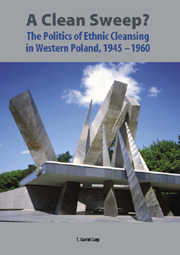Book contents
- Frontmatter
- Contents
- Acknowledgments
- Introduction: Hearts and Minds and Land: Ethnic Cleansing and the Stabilization of Postwar Poland
- 1 How the East Was Lost: Germany's Struggle for the Polish-German Borderlands, 1870–1945
- 2 Who Won the West: The Colonists and Ethnic Cleansers of Poznań and Eastern Brandenburg in 1945
- 3 Acts of Sacrifice: Poland's Ethnic Cleansing and the End of Political Pluralism, 1945–47
- 4 Counterrevolution from Above and Abroad: The Delocalization of Politics and the Beginning of Polish Stalinism's Antinational Counterrevolution, 1947–49
- 5 Waging Counterrevolution: The Party-State's Struggle for Hearts, Minds, and Land in Wielkopolska, 1949–53
- 6 Revolutions before the Revolution: National Solidarity and the Long Retreat of Stalinism in Wielkopolska, 1953–56
- 7 The Revolutions Betrayed? The Poznań Revolt and the Polish Road to Nationalist Socialism, 1956–60
- Conclusion: A Near Run Thing From National Solidarity to Solidarity
- Abbreviations
- Notes
- Bibliography
- Index
4 - Counterrevolution from Above and Abroad: The Delocalization of Politics and the Beginning of Polish Stalinism's Antinational Counterrevolution, 1947–49
Published online by Cambridge University Press: 12 September 2012
- Frontmatter
- Contents
- Acknowledgments
- Introduction: Hearts and Minds and Land: Ethnic Cleansing and the Stabilization of Postwar Poland
- 1 How the East Was Lost: Germany's Struggle for the Polish-German Borderlands, 1870–1945
- 2 Who Won the West: The Colonists and Ethnic Cleansers of Poznań and Eastern Brandenburg in 1945
- 3 Acts of Sacrifice: Poland's Ethnic Cleansing and the End of Political Pluralism, 1945–47
- 4 Counterrevolution from Above and Abroad: The Delocalization of Politics and the Beginning of Polish Stalinism's Antinational Counterrevolution, 1947–49
- 5 Waging Counterrevolution: The Party-State's Struggle for Hearts, Minds, and Land in Wielkopolska, 1949–53
- 6 Revolutions before the Revolution: National Solidarity and the Long Retreat of Stalinism in Wielkopolska, 1953–56
- 7 The Revolutions Betrayed? The Poznań Revolt and the Polish Road to Nationalist Socialism, 1956–60
- Conclusion: A Near Run Thing From National Solidarity to Solidarity
- Abbreviations
- Notes
- Bibliography
- Index
Summary
The Soviet Union is not only our ally, it is success for the nation; for us, for party members. The Soviet Union is our fatherland, and I am incapable of defining our borders, which are today beyond Berlin and tomorrow at Gibraltar.
—Mieczysław Moczar making his profession de foi while condemning Gomułka's “right-wing nationalist deviation” in 1948Polish Communism's wartime embrace of nationalist politics was not unique. By 1947, Communist parties throughout Europe enjoyed a great deal of success in proclaiming themselves to be not only the most progressive of political forces but also, by virtue of their role in the post-June 22, 1941 anti-Nazi resistance, to be the most patriotic of parties in their various countries. In spite of this, in Poland as in most of the other states of the Soviet bloc, the identification of Communism with nationalism and ethnic cleansing produced deep internal tensions within the emerging People's Democracies and between these countries and their Soviet masters. In the decades prior to the war, Communist activists had been on the fringes of their countries' politics. Now they could plausibly pass themselves off as patriots—while casting opposition to their hegemony as not only fascist, but a betrayal of their countries' national interests as well. Yet, in the face of the relentless nationalism of postwar political life, many leading Communist activists feared that they and their parties were going ideologically blind.
- Type
- Chapter
- Information
- A Clean Sweep?The Politics of Ethnic Cleansing in Western Poland, 1945–1960, pp. 80 - 106Publisher: Boydell & BrewerPrint publication year: 2006



